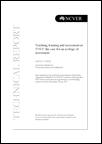Description
This paper argues that assessment can play a central role in teaching and learning, and selecting an appropriate mix of assessment strategies can satisfy multiple goals of key stakeholders in vocational education and training. These goals include promoting learning, certifying learning and program evaluation. These objectives must be understood in a broad context delineated by the structures of education systems and of labour markets which, in turn, reside within national policy objectives. Forms of assessment must be consistent with the goals of learning and with a broad range of valued learning outcomes.Summary
About the research
Rather than being an event that occurs after instruction to check on individual learning, assessment can be central in driving high-quality learning and instruction. As such, assessment should be a process that is designed into teaching and learning.
It is helpful to think about teaching, learning and assessment in vocational education and training (VET) as components of an 'ecosystem' of skills, including their development and deployment; of the agents who operate within the system, the teachers, learners and administrators of the system; and of the social and industrial contexts in which skills are developed, certified and deployed.
The paper argues that:
- Selecting an appropriate mix of assessment strategies can satisfy the multiple goals of key stakeholders in VET.
- Forms of assessment must be consistent with the goals of learning and with a broad range of valued learning outcomes.
- Many forms of assessment are available, and a key task is to match these forms with goals for assessment and with desired learning outcomes. This matching needs to occur within courses and at a systems level in order to achieve the diversity of assessment goals.
Tom Karmel
Managing Director, NCVER
